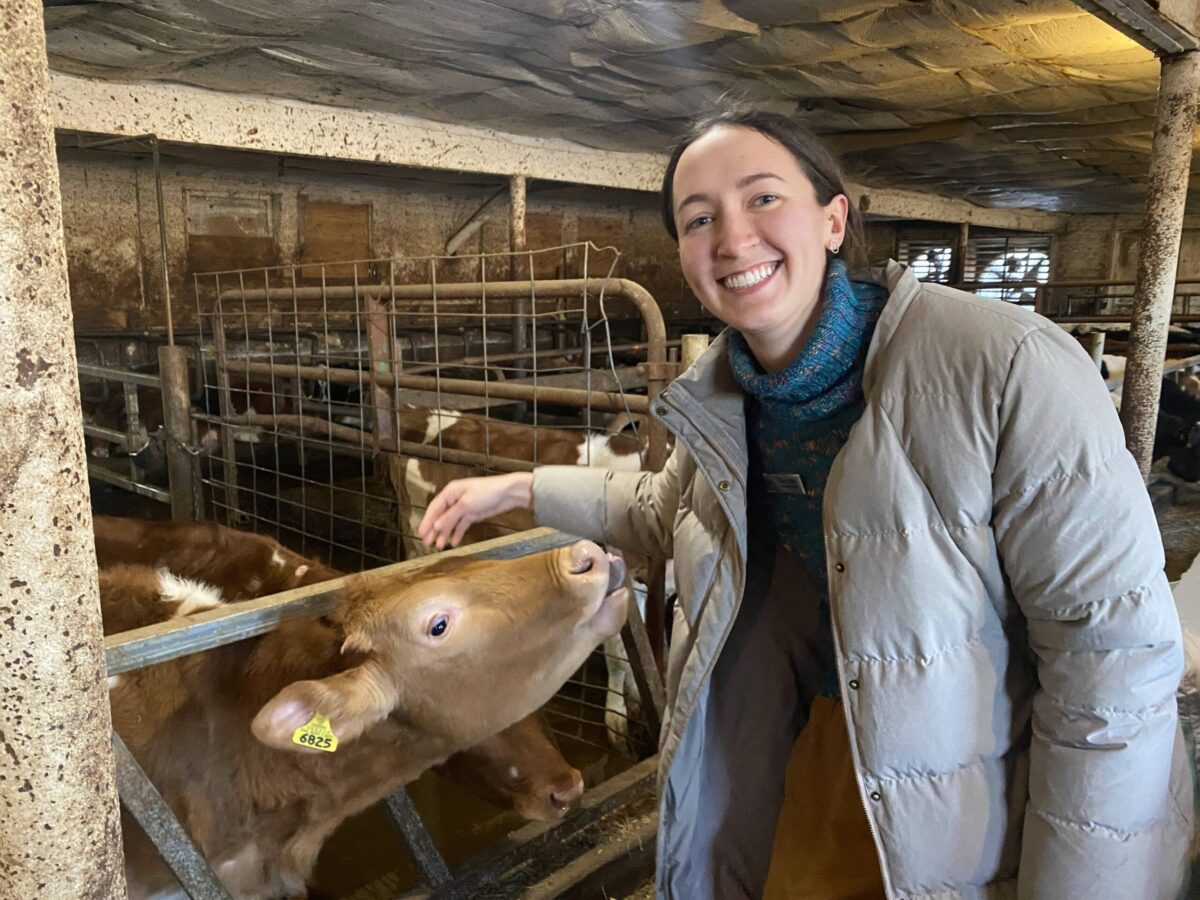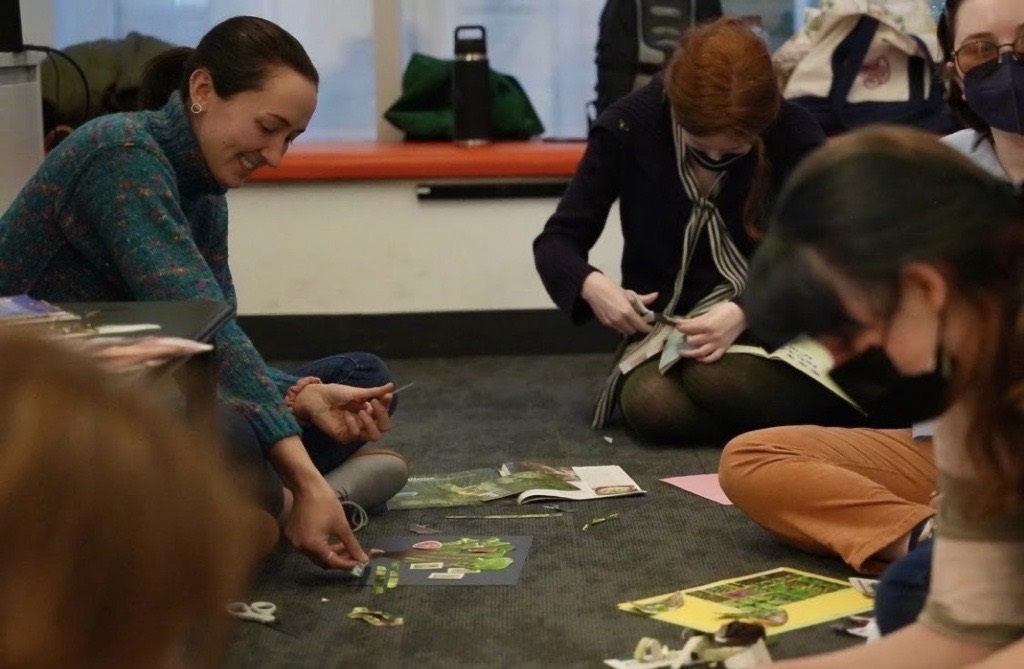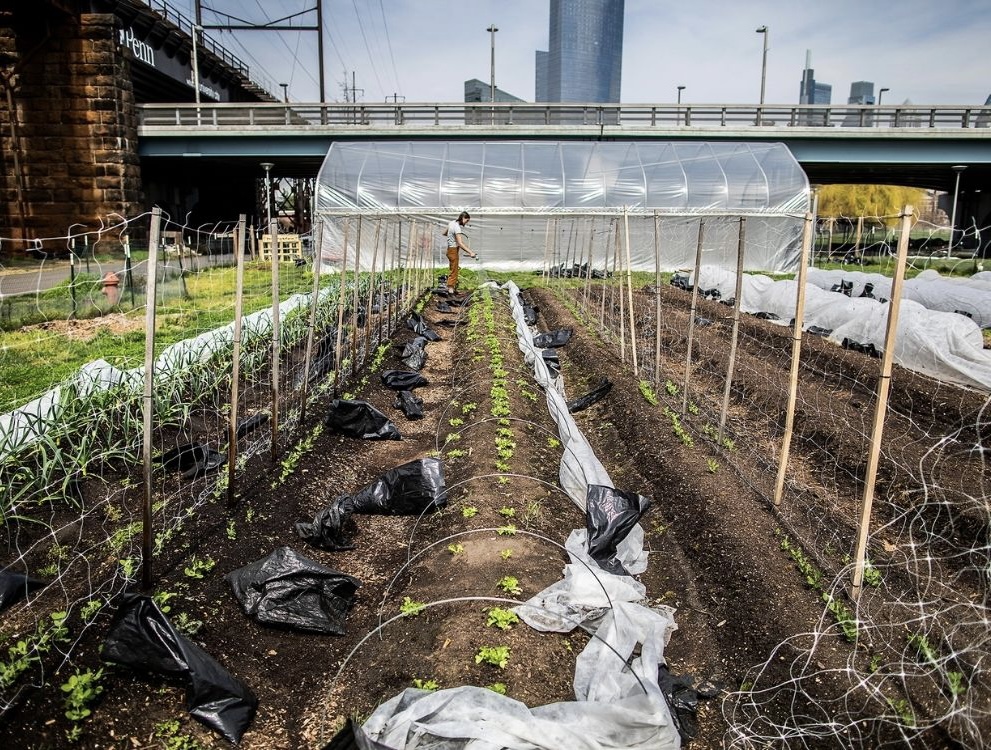Stories and Reflections from Elise Dudley, our East Coast Fellow
- by Elise Dudley

Elise at Coon Brothers Dairy in Upstate NY
I can still remember wandering through a sea of broad-leafed bibb, bitter frisée, and tangy watercress greens at Stone Creek Hydroponics in Hartwell, Georgia during my first month traveling as a Bon Appétit Fellow. Not long after the greenhouse tour concluded, I was invited to stay for dinner with the Unruh family and I found myself in the kitchen with Zach and Janelle (and their five sons) chatting about farming, community living, and hearing how neighbors rallied around their farm during the pandemic.
When I left full-time farming to start the Fellowship, I knew I would be a traveling food systems educator, but I rapidly realized my dream job had so much more to teach me.
Over the past two and a half years and nearly 50 visits to higher education accounts, my understanding of food systems change has been stretched and tested. As I’ve traversed the East Coast, I’ve witnessed the stories behind food served in our cafés, and the personal impact of local sourcing on small farms and food businesses from tofu-makers to chicken farmers, cattle ranchers to oyster hatchery managers.
The more stakeholders I’ve met, the more anecdotal and nuanced my understanding of the food system has become. I grasped the consolidation of the dairy industry at Coon Brothers Dairy Farm, as farmer Dave Coon explained how they are the sole remaining working farm on a stretch of road that used to contain 50 dairies. I faced the final resting place of waste at the Oneida-Herkimer Solid Waste Authority, standing under towering mounds of recycling to watch (and smell) food waste become a slurry to enter an anerobic digester. And as I dressed up kids as plants to illustrate all the parts of plants we eat; I considered how transformative being connected to the source of our food is and the importance of developing a relationship with food early on in life.
I never could have imagined all the opportunities I would have to contribute to Bon Appétit’s vision of food service for a sustainable future. As the whirlwind of travel and projects are coming to an end, I still feel the same sense of awe and gratitude that I did winding through Georgia farmland two years ago. Here are a few of my most resonant takeaways.
Food systems education needs a creative approach

It’s no secret that food and farming system issues and other systemic challenges exist at daunting and incomprehensible scales. But when made tangible through experiential activities, I’ve seen students grapple with these issues in new, often personal ways. It’s become clear to me that there is great power in harnessing creative expression for reflection and social change.
In my opening article over two years ago, I shared how my passion for food came out of a love for creativity. It’s been a delight to be trusted to develop out-of-the-box approaches to food education centering creativity. These programs have ranged from sketching post-consumer food waste to practicing mindfulness through blending loose-leaf tea, telling food system stories through collage, and upcycling food waste materials from kitchens into natural dyes. It’s easy to preach to the choir of students who are already conscious of food systems issues, but taking unusual avenues to connect with wider audiences has been incredibly rewarding and fun!
Industry partnerships are crucial (and seafood is delicious)
Last fall I wrote about food hubs, and how powerful regionally focused food aggregators and distributors are for enhancing the capacity of our culinary teams to access local food. These businesses and non-profits working to increase resiliency, connectedness, and access in their area are having incredible impact. Industry partnerships are also crucial to systems change, and partnering with businesses like Numi Organic Tea and Clemens Food Group, who have done the diligent work of creating robust and transparent supply chains, is an invaluable asset. Additionally, relationships with experts at ReFED, Seafood Watch, The Humane Society, Food Recovery Network, Coalition of Immokalee Workers, and many more have helped establish the cornerstone for so many of our companywide initiatives and purchasing commitments.
Red’s Best is a prime example of a key regional partner and aggregator — not of vegetables, but of fish! On a personal note, I have not consumed seafood (or any animal protein for that matter) for many years and I have always embraced the ability to manifest my values daily through my food choices. Yet, as I have learned about the need to shift demand away from globalized fisheries and towards “underloved” species that are abundant in New England’s waters, I have started indulging in local seafood. It has been a delicious adventure of learning how to enjoy seafood responsibly!
Sustainability looks different in different contexts
From St. Petersburg to Savannah, to Cleveland and Cambridge, I’ve been privileged to navigate entirely new landscapes and regional foodsheds. As I’ve traveled, I’ve come to understand that our food systems are diverse, and sustainability looks different in different contexts.
In rural upstate New York, the logistics of diverting food waste from landfills look very different from downtown Boston, where there are a plethora of composting companies and anaerobic digesters able to haul waste. Each town and city has its own strengths and limitations. In Florida and South Carolina, the growing season and accessibility of fresh local food through the winter looks different than in Connecticut or Ohio. Legislative environments also differ from state to state impacting the sourcing of food (such as Question 3 in Massachusetts and Proposition 12 in California) and management of post-consumer waste. Therefore, our culinary teams must take different legislation into consideration in their operations, though our companywide commitments are typically ahead of the curve.
So many lessons learned for the next step
The Fellowship has challenged me to be adaptable, flexible, and develop skills for facilitating thoughtful discussions about complex issues. I have witnessed firsthand the lingering instability of supply chains after the pandemic, the growing need for and demand of plant-based foods, and how precious dining spaces are for building community and education.
I’ve also developed skills for effectively communicating climate and sustainability challenges to diverse audiences, considering various perspectives and political sentiments. I believe that everyone can find an avenue to connect with social and environmental sustainability issues through food. At the end of the day, we all eat.
Finally, I’ve drawn a great deal of inspiration from the countless dedicated chefs, farmers, artisans, educators, and student activists I have worked with along the way. It has been a privilege to support our culinary teams in promoting localized and climate-friendly dining on the East Coast and help tell their stories, too! I am grateful for every relationship gained along the way, and I am energized to continue using my voice and career to promote a food system that is more equitable, regenerative, and community centered.
